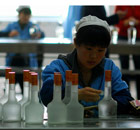Top Biz News
Millions on move as Spring Festival is coming
(Xinhua)
Updated: 2010-02-01 14:23
 |
Large Medium Small |
BEIJING: China on Jan 30 began its annual mass passenger transportation for the traditional Lunar New Year, with an expected 2.54 billion journeys in the coming 40 days.
The figure is 7.7 percent up from the corresponding period last year, according to the Ministry of Transport.
Passengers would make 2.27 billion journeys by bus, up 7.5 percent year on year, and 32 million journeys by ship, up 3.6 percent, said He Jianzhong, a spokesperson with the Ministry of Transport.
A total of 820,000 buses and 20,000 ships would be in service during the travel season and additional buses would be arranged to meet demand following changes of passenger flow, He said.
The railways are expected to transport 210 million passengers, up 9.5 percent year on year, or 5.25 million passengers per day, according to the Ministry of Railways.
About 28.94 million passengers are expected to travel by plane, up 12.5 percent year on year, according to the Civil Aviation Administration.
China's Spring Festival travel season this year started from Jan 30 and will end on March 10.
Spring Festival is the most important Chinese festival for family reunion. People return home from work or study to have a reunion dinner with families on the New Year's Eve.
The travel season, or Chunyun (spring transportation), is an annual test on China's transportation systems.
Real-name ticket system on trial
The first 600,000 travelers with real-name tickets are going on their journeys home Saturday from Guangdong Railway Group's many stations in southern Guangdong Province. They are the first to benefit from China's new measure in curbing ticket hoarding after years of unsuccessful crackdowns against scalpers.
The real-name train ticket system is being piloted by China's Ministry of Railways among the stations operated by Guangzhou Railway Group (GRG). It is likely to be promoted to other parts of China if proved effective.
"I've been trying to buy tickets home for the Spring Festival for many times. This was the easiest," said Li Youyuan, a migrant worker from central Hunan province. Li is among the 120,000 scheduled to leave Guangzhou Railway Station Saturday.
The real-name ticket system prevented scalpers from hoarding tickets, also made it fair for everyone to buy tickets, said migrant worker Zhou Huatong, "I got the ticket because I came earlier than the others. It's fair enough."
At the entrance gate to the platform, an inspector takes a traveler's ticket and ID card, which are separately scanned on two equipments. Screens soon display the information of the ticket's purchaser and the ID card holder with photos. The inspector will stamp the ticket and let the traveler go when he sees that the names and codes on the ticket and ID card matches.
GRG started to sell real-name tickets, which require the buyer to show ID card or other identity document upon purchase, on Jan 21, 10 days in advance to the trains' scheduled start.
The real-name system has drawn much attention in China. People are waiting to see whether the system can effectively curb ticket hoarding. There are also worries that the newly introduced ID checks may paralyze railway stations because of the heavy workload involved.
No disorder is reported from any of the stations so far. The queues are not worsen by the ID checks as people have worried, at least by now, said an GRG official who declined to give his name.
"It is early to call the system successful as real tests are still ahead," said Yue Jinglun, a sociologist with Guangdong's Zhongshan University.













